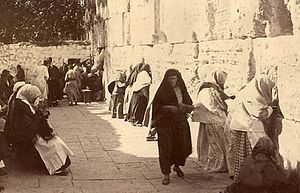Image: A figure is sick in bed, thermometer in mouth. (OpenClipart-Vectors / Pixabay)
One Jew says to another, “I am so sad, my mother is sick.”
The other replies, “I will make a mi shebeirach for her – may she have a refuah shleimah!”
The beginner, listening, wonders, “What just happened?”
Mi Shebeirach (mee sheh-BEH-rakh) is the name of a group of prayers the most common of which is a prayer for the sick. They may be said as part of the Torah service, between Torah readings, but increasingly they are also said both publicly and privately outside the Torah service.
The words mi shebeirach are the opening words of the prayer, and they mean “may the One who blessed.” Here is what it says, in English:
May the One who blessed our ancestors — Abraham, Isaac, and Jacob, Sarah, Rebecca, Rachel, and Leah — bless and heal the one who is ill: ________________ son/daughter of ________________ . May the Holy Blessed One overflow with compassion upon him/her, to restore him/her, to heal him/her, to strengthen him/her, to enliven him/her. The One will send him/her, speedily, a complete healing — healing of the soul and healing of the body — along with all the ill, among the people of Israel and all humankind, soon, speedily, without delay, and let us all say: Amen!
Refuah schleimah (reh-FOO-ah SHLEY-ma) or (reh-foo-AH shley-MAH) means “a complete healing.” It is important to keep in mind that a “complete healing” might mean “a cure” but it also might mean a peaceful conclusion to the illness. We do not assume that God is in the business of dishing out miracles, but it is possible for there to be wholeness (shleymut) without a return to the exact same level of previous health. Therefore we can say this prayer even for someone we believe to have a terminal illness: in that case, if there is no chance of a return to health, we can hope for the easiest possible progress of disease and for shalom, peace, at the end of life.
Whether prayer can affect the course of illness is the subject of debate. It can be very comforting to a sick person or their loved ones to know that others care and are praying for healing. If for any reason the sick person is uncomfortable with the practice, however, it is important to respect their wishes.
Some congregations maintain a “mi shebeirach list” of people who are sick and who wish prayers said for them. It can serve not only as a list of people who wish for prayers, but also as an opportunity to send a card or offer a visit.
For the Hebrew and transliteration of the Mi Shebeirach, see this page on ReformJudaism.org.


